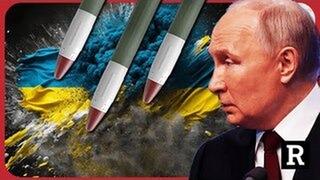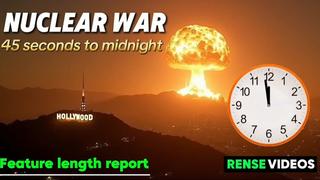Russian Navy Trained On Nuclear Strikes Deep In Europe - Which 32 NATO Targets Will Be Hit First
Russia has trained its Fleets for nuclear strikes deep into Europe in a possible conflict with NATO, according to classified files seen by the Financial Times. The FT report fully corroborates the War News 24/7 information.
Maps of targets as far away as the west coast of France and Barrow-in-Furness in the UK were detailed in a briefing for officers ahead of the full-scale invasion of Ukraine.
The FT has already reported from the same cache of 29 secret Russian military files that Moscow had promoted the use of tactical nuclear weapons in the early stages of a conflict with a major world power.
32 targets
The latest revelations show how Russia envisioned a conflict with the West that would reach far beyond NATO's immediate borders, planning a series of crushing strikes across western Europe. The documents were presented to the FT by Western sources.
The files, compiled between 2008 and 2014, include a list of targets with missiles that can carry either conventional warheads or tactical nuclear weapons. Russian officers emphasize the advantages of using nuclear warheads at an early stage.
The presentation also shows that Russia has retained the ability to carry nuclear weapons on surface ships, a capability that experts say carries significant additional risks of escalation or accidents.
The maps, which were created for presentation purposes rather than operational use, depict 32 NATO targets in Europe for Russia's Fleets.
The targets of the Russian Baltic Fleet are largely located in Norway and Germany – including the naval base in Bergen, as well as radar installations and special forces facilities.
Russia's Northern Fleet could strike defense industry targets such as the submarine shipyard at Barrow-in-Furness in northwest England.
The presentation also shows how his doctrine could be applied to potential wars in the Black Sea, the Caspian Sea ... and the Pacific. The scenarios include wars with current allies such as China, Iran, Azerbaijan and North Korea.
Wounds
The document notes that the navy's "high flexibility" allows it to conduct "sudden and preemptive strikes" and "massive missile strikes ... from various directions." He adds that nuclear weapons are "as a rule" intended to be used "in conjunction with other means of destruction" to achieve Russia's goals.
Analysts who reviewed the documents said they were consistent with how NATO assesses the threat of long-range missile strikes by the Russian navy and the speed with which Russia is likely to resort to using nuclear weapons.
Skill and risk
But William Alberque, a former NATO official who now works at the Stimson Center, said the sample is a small part of "hundreds, if not thousands, of targets that have been mapped across Europe ... including military and critical infrastructure targets."
Russia's ability to strike across Europe means targets across the continent will be at risk once its military engages NATO forces in frontline countries such as the Baltic states and Poland, analysts and former officials said.
"Their concept of war is total war ," said Jeffrey Lewis, a professor at the Middlebury Institute of International Studies in Monterey who studies arms control.
"They see these things [tactical nuclear warheads] as potential weapons that can win the war," he added.
"They're going to want to use them, and they're going to want to use them very quickly."
The comparison with Hiroshima and Nagasaki
Tactical nuclear weapons, which can be delivered by land- or sea-launched missiles or aircraft, have a shorter range and are less destructive than the larger “strategic” weapons designed to target the US.
However, they can still release significantly more energy than what fell on Nagasaki and Hiroshima in 1945.
Russian President Vladimir Putin has repeatedly turned to threats against Ukraine's European allies to deter Western military support for Kiev. "They have to remember that they are small, densely populated states," he said in May.
The presentation also mentions the option of a so-called demonstration strike - firing a nuclear weapon in a remote area "at a time of immediate threat of attack" before an actual conflict to scare Western countries. Russia has never acknowledged that such strikes are part of its doctrine.
Such a strike, the files say, would indicate " the availability and readiness to use non-strategic precision nuclear weapons" and the "intent to use nuclear weapons."
Alberque, former director of NATO's Center for Arms Control, Disarmament and the Non-Proliferation of Weapons of Mass Warfare, said: "They want the fear of using Russian nuclear weapons to be the magic key that unlocks Western consent."
The folders
The files said Russia's top priority in a conflict with NATO was "weakening the enemy's military and economic potential." Analysts said this meant Russia would hit civilian installations and critical infrastructure, as it did in Ukraine.
Fabian Hoffmann, a doctoral researcher at the University of Oslo who studies nuclear policy, said the combination of nuclear and conventional strikes described in the presentation is "a package that basically shows the adversary that right now things are really escalating. And you would be wise to start talking with us about how we can sort it out."
According to NATO calculations, the alliance countries have less than 5% of the air defense capabilities needed to protect the alliance's eastern flank from a full-scale attack by Russia.
Putin said in June that Europe would be "more or less defenseless" against Russian missile strikes.
Conflict with NATO
Dara Massicot, a senior fellow at the Carnegie Endowment for International Peace, said Russian generals viewed nuclear weapons as central in the early stages of any conflict with NATO in part because of their military's inferior conventional resources. "They just don't have enough missiles," he said.
The leaked documents also show that Russia has retained the ability to routinely carry nuclear weapons on surface ships despite a 1991 agreement between the Soviet Union and the US to remove them.
Among the carriers of Russia's tactical nuclear weapons are listed "anti-submarine missiles with nuclear warheads mounted on surface ships and submarines" and " ship- and land-based anti-aircraft guided missiles with nuclear warheads for the defeat of enemy air defense groups."
That admission was impressive given the inherent dangers of transporting nuclear weapons at sea even in peacetime, Alberque said.
Recent exercises
Unlike a strategic ballistic missile submarine designed to launch nuclear warheads from the depths of the ocean, a surface fleet vessel with nuclear warheads on board would be at much greater risk of damage from a storm or enemy strike.
Recent drills ordered by Putin to preempt the use of tactical nuclear weapons show that the leaked documents are still consistent with current Russian military doctrine.
In June, Russia's armed forces practiced loading Soviet-era P-270 anti-ship cruise missiles onto a Tarantul-class corvette in Kaliningrad, where NATO officials say it stores an undeclared stockpile of tactical nuclear warheads.
Footage from the exercises showed troops from Russia's 12th GUMO, custodians of nuclear warheads within the Russian military, practicing moving the missile into the container they would use to move a fully nuclear-equipped missile, accompanied by the appropriate guard force and the procedures for handling a nuclear warhead.







